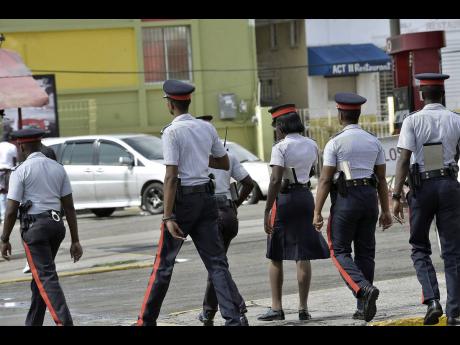Editorial | Address JCF attrition
The Jamaica Constabulary Force (JCF) is haemorrhaging and Police Commissioner Major General Antony Anderson appears resigned to the fact that the revolving door of policemen and women heading to greener pastures will continue over time.
The JCF boss, facing the loss of some 450 JCF members annually, told a Police Federation conference earlier this week that it is highly unlikely that the High Command could introduce a programme to stop the exodus.
Major General Anderson identified migration and resignations as the main reasons why between two per cent to four per cent of JCF members leave the service each year. Then there is retirement, which accounts for the other huge chunk of JCF members’ exit.
From the explanation given by Major General Anderson, the strategy being adopted by the JCF is to simply train more personnel than is needed. There are about 1,250 recruits being trained at the moment. And the clear suggestion is that we can afford to lose 450, because we would still have 800. What about experience and know-how? Don’t they count for something?
Labour mobility has created gaps, and several local sectors are now reeling. From skilled artisans to nurses and teachers, the significant wage differentials between Jamaica and her neighbours is attracting many workers away from these shores in search of a better life. So the strategy of training more than necessary is also being applied to other sectors.
WEAKEN INSTITUTIONS
Widespread worker disillusionment, shortages, low morale and disengagement are threatening to weaken many of the institutions on which the economy depend for growth. The teachers, nurses and policemen come readily to mind. Can Jamaica afford to lose its experienced policemen and women in the current high-crime environment? Addressing teacher shortage should be another priority area because they provide quality learning, emotional support and guidance in the social development of our young people. The shortage of nurses will continue to have a debilitating effect on the quality of healthcare. So how the Government responds to these glaring gaps will be crucial for Jamaica’s future.
It is true that Jamaica is not alone in trying to solve the problems of high turnover. The crisis in teacher supply is being felt even in First-World countries, who are not bashful about dangling the carrot for talented workers wherever they can be found. For example, the spiking rate of resignations reported by the New York Police Force, of 47 per cent resignations and 19 per cent retirement in 2022 over 2021 figures present a grim picture.
What, then, are the options to stem attrition in these critical disciplines? Higher wages might attract some recruits, but will that be enough to keep them in the JCF. We believe that a National Workforce Action Plan should be seen as an immediate priority, one that has input from workers themselves as to what improvements they would like to see implemented.
We are sympathetic to the arguments that the solutions are neither easy nor cheap. It cannot be an easy fix to reverse poor working conditions and extreme stress brought on by volatility in the streets. It seems that some creative thinking needs to be applied; for example, should valuable police time be taken up pointing a radar gun at speeding motorists? Are there more efficient ways to detect and punish errant motorists, while freeing up the police to do investigative or preventative work in the community?
Major General Anderson faces an overall challenging situation, for there is no doubt that staffing crisis in the police force spells danger for public safety. Major General Anderson’s problem is Jamaica’s problem.

